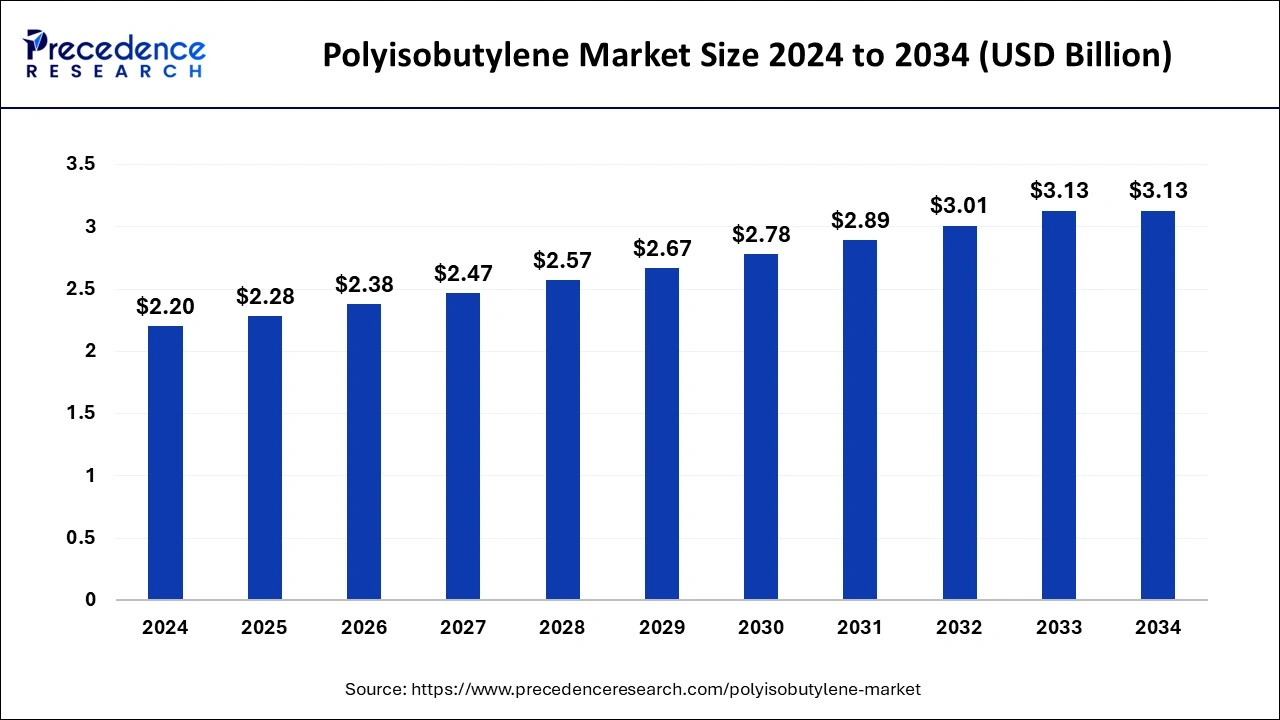The global polyisobutylene market size is estimated to rake around USD 3.13 billion by 2033, growing at a CAGR of 4.03% from 2024 to 2033.
Key Points
- Asia Pacific dominated the market with the largest market share of 34% in 2023.
- North America is the fastest growing region and is expected to grow significantly in the forecast period.
- By product, the high molecular weight polyisobutylene segment has held the major market of 66% in 2023.
- By product, medium molecular weight polyisobutylene segment is the fastest growing segment and is expected to grow significantly in the forecast period.
- By application, the lubricant additives segment has contributed more than 56% of market share in 2023.
- By application, the automobile industry segment is the fastest growing segment and is expected to grow continuously in the forecast period.
The polyisobutylene (PIB) market is experiencing steady growth owing to its diverse applications in industries such as automotive, construction, lubricants, and pharmaceuticals. Polyisobutylene is a versatile polymer with unique properties, including high viscosity, flexibility, and impermeability to gases, making it ideal for various applications such as adhesives, sealants, lubricants, and fuel additives. The market for polyisobutylene is expected to expand further due to increasing demand for durable and high-performance materials across different sectors globally.
Get a Sample: https://www.precedenceresearch.com/sample/4249
Growth Factors
Several factors contribute to the growth of the polyisobutylene market. One key driver is the rising demand for adhesives and sealants in construction and automotive industries. Polyisobutylene-based sealants offer excellent adhesion and weather resistance, driving their use in window seals, automotive gaskets, and roofing applications. Additionally, the expanding automotive industry, particularly the demand for tubeless tires and fuel-efficient vehicles, is boosting the consumption of polyisobutylene as a tire sealant and fuel additive. Moreover, the pharmaceutical industry’s growing reliance on PIB for its non-reactive and stable properties in drug formulations is further propelling market growth.
Region Insights
The polyisobutylene market exhibits regional variations in demand and consumption patterns. North America and Europe lead in terms of consumption, driven by established automotive and construction sectors and stringent regulatory standards promoting the use of PIB-based products. Asia Pacific is emerging as a significant market due to rapid industrialization, urbanization, and infrastructure development, particularly in countries like China and India. The Middle East and Africa also show potential growth opportunities, supported by investments in infrastructure and increasing automotive production.
Polyisobutylene Market Scope
| Report Coverage | Details |
| Polyisobutylene Market Size in 2023 | USD 2.11 Billion |
| Polyisobutylene Market Size in 2024 | USD 2.20 Billion |
| Polyisobutylene Market Size by 2033 | USD 3.13 Billion |
| Growth Rate from 2024 to 2033 | CAGR of 4.03% |
| Largest Market | Asia Pacific |
| Base Year | 2023 |
| Forecast Period | 2024 to 2033 |
| Segments Covered | By Product and By Application |
| Regions Covered | North America, Europe, Asia-Pacific, Latin America, and Middle East & Africa |
Polyisobutylene Market Dynamics
Drivers
The polyisobutylene market is driven by several factors influencing demand across industries. In the automotive sector, the shift towards tubeless tires and increasing focus on fuel efficiency drive the adoption of PIB-based tire sealants and additives. In the construction industry, the demand for high-performance sealants and adhesives for building applications contributes to market growth. Additionally, the pharmaceutical industry’s need for stable and inert materials in drug formulations fuels the use of polyisobutylene in medical applications.
Opportunities
The polyisobutylene market presents various opportunities for expansion and innovation. Collaborations between manufacturers and research institutions to develop advanced PIB-based products with enhanced properties offer significant growth potential. Expansion into emerging markets in Asia Pacific and Latin America provides opportunities to tap into growing industrial sectors and meet increasing demand for specialty chemicals. Moreover, the development of bio-based polyisobutylene derived from renewable feedstocks presents a sustainable opportunity in response to environmental concerns.
Challenges
Despite its growth prospects, the polyisobutylene market faces certain challenges. Fluctuations in raw material prices, particularly butene, impact production costs and profit margins for manufacturers. Regulatory challenges related to environmental standards and safety regulations require compliance and may influence product formulations and market access. Additionally, competition from alternative materials and technologies in specific applications poses a challenge to the widespread adoption of polyisobutylene.
Read Also: Microalgae Fertilizers Market Size to Rake USD 32.25 Bn by 2033
Polyisobutylene Market Recent Developments
- In Aug 2023, BASF announced its plans to increase the production rate of medium molecular weight polyisobutylene. As an outcome, the rise in demand of polyisobutylene is experienced globally.
- In Aug 2022, Quanex announced the launching of new moisture protectant for solar panels that can be useful for manufacturers to apply during the final manufacturing process.
Polyisobutylene Market Companies
- BASF SE
- Daelim Co., Ltd.
- TPC Group
- INEOS
- Kothari Petrochemicals
- Braskem
- ENEOS Corporation
- Zhejiang Shunda New Material Co., Ltd.
- Shandong Hongrui New Material Technology Co., Ltd.
Segments Covered in the Report
By Product
- High Molecular Weight
- Medium Molecular Weight
- Low Molecular Weight
By Application
- Adhesives & Sealants
- Automotive Rubber Components
- Fuel Additives
- Lubricant Additives
- Others
By Geography
- North America
- Asia Pacific
- Europe
- Latin America
- Middle East & Africa
Contact Us:
Mr. Alex
Sales Manager
Call: +1 9197 992 333
Email: sales@precedenceresearch.com
Web: https://www.precedenceresearch.com
Blog: https://www.expresswebwire.com/
Blog: https://www.dailytechbulletin.com/
Blog: https://www.autoindustrybulletin.com/


